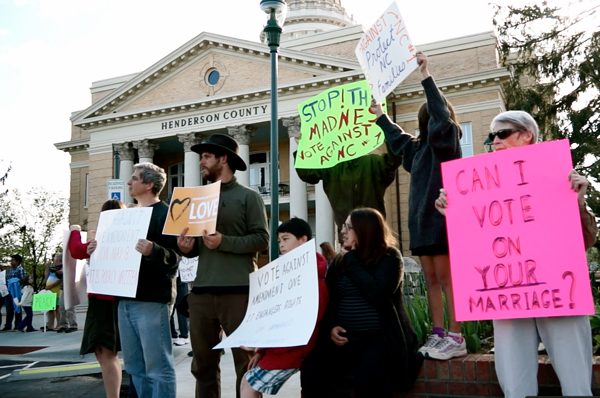Documentary on marriage equality looks to build bridges”¦the hard way.
It started on prom night.
Filmmaker Becca Roth describes what happened two years ago when her alma mater, Kenyon College, hosted an alternative high school prom for gay and lesbian students in nearby Mt. Vernon, Ohio: “We were met with dozens of angry protesters, all old enough to be these kids’ parents, screaming excerpts from the Bible and declaring that we were all going to hell.”
Many of Mt. Vernon’s gay teens didn’t feel comfortable at their school’s prom because of the town’s socially conservative atmosphere. This alternative event, intended as a safe haven, ended up sparking conflict. Roth and a few other event organizers confronted the protestors, and in the melee she found both anger and inspiration.
“I actually came up with the idea to make a documentary right as the event was happening,” she says. “I realized how unproductive [arguing] was, and wanted to see what would happen if I took a different approach.”
Roth’s initial idea for a documentary exploring the conflict between a conservative small town and a neighboring liberal city never bore fruit. But now she’s in the midst of principal photography on Hear Our Stories, a planned feature-length documentary chronicling the controversy around the amendment to North Carolina’s state constitution banning all forms of same-sex union.
The law is so draconian that even prominent anti-gay marriage groups like the Institute for American Values spoke out against it. Gay marriage was already illegal in North Carolina, but opponents still insisted on a constitutional referendum. The amendment passed with 60 percent of the vote on the May 8 primary ballot.
Roth’s crew traveled North Carolina for months documenting the anger, pain and frustration roiling the state ahead of the contentious ballot. Roth took a fly-on-the-wall approach, hoping to catch people in the midst of everyday life. “The best documentaries are not just people sitting and talking, they’re about being there in people’s lives,” she says. “They’re just people doing people-y things.”
Though Roth hoped that North Carolinians would not pass the ban, she is quick to explain that the “Our” in Hear Our Stories does not refer only to gay and lesbian couples and their allies but to everyone, on all sides of the debate. “Being gay and believing that there should be marriage equality doesn't mean that I automatically want to paint people who disagree with me in a bad light,” Roth says. Recalling the futility of the screaming match in Mt. Vernon, Roth decided that the film should give equal weight to everyone’s views…even those contrary to her own. “I think some people who oppose same sex marriage may be scared of the unknown, but also by the fact that they're often called names, just as we are. It's not nice to hear a stranger call you a bigot, especially if you believe in your heart of hearts that your beliefs are justified,” Roth says.
Building bridges is tough work, though. Roth found many North Carolinians eager to share their stories, but those campaigning in favor of the ban tended to give the project a wide berth. “One group that I reached out to actually sent an email to its entire mailing list urging people to look out for an ‘unfriendly media person’, mentioning me by name.” From that point on, Roth’s producer had to solicit most interviews, since Roth herself was “essentially blackballed.”
With tenacity, the pair got a few ban proponents to come around, at least enough to agree to talk on camera. Though initially daunting, at least one of the interviews turned out to be illuminating on all sides: “Once we all sat down together, almost immediately they asked how we [Roth and her producer] knew each other. We were nervous, but we wanted to be honest, so we told them we were dating. They had so many questions about gay stereotypes that they had been taught for years and had never had the opportunity to question.”
The results of the vote cast a pall over the project, but Roth remains characteristically optimistic that the situation can be salvaged. “People are devastated, but they are putting on a hopeful face,” she says. Roth cites President Obama’s public endorsement of marriage rights for gays and lesbians the day after the vote as a watershed moment for the country even in the face of regional disappointments.
Principle photography will wrap soon, and then it’s time for a long summer of editing before marketing the film to festivals in the fall. With the political climate in North Carolina still fluid, Roth isn’t yet sure just what kind of movie she’s made. “That's a good question, whether this outcome will affect the way the film is edited. I'm honestly not sure yet. Stay tuned.”
